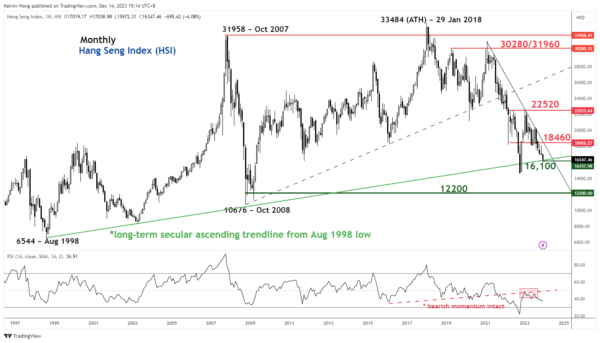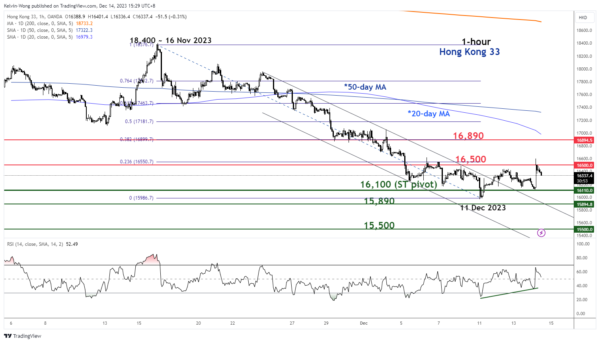- Short-term technical analysis suggests a potential countertrend rebound with intermediate resistance at 16,890.
- China’s top policymakers’ reluctance to focus on making domestic demand revival a top priority for 2024 is likely to put a damper on positive animal spirits in the long term.
- A focus on making high-tech industrialization a top policy may trigger more headwinds for China and Hong Kong stock markets.
The China and Hong Kong benchmark stock indices have managed to catch a positive feedback loop from yesterday’s risk-on rally triggered by the US Federal Reserve’s dovish guidance.
But overall, their major downtrend phases have remained intact since February 2021 with the Hang Seng Index on track to end 2024 with a fifth consecutive yearly loss (2023 year-to-date loss is at 17% at this time of the writing); its worst performing streak since January 2002.
A similar weak performance is being reflected in the China CSI 300, on sight for a third consecutive yearly loss with a current year-to-date loss of -12.7% for 2023.
The persistent underperformance of China and Hong Kong stock markets against the rest of the world has been driven by past “unfriendly” private sector policies enacted in China, lingering geopolitical tensions with the US, and the right now, heightened deflationary risk spiral due to the liquidity crunch inflicted in the property market where it has a significant wealth effect on China’s society.
China’s top policymakers placed industrialization policy as the top priority for 2024
The recently concluded China’s annual economic work conference attended by the top leadership stated that next year’s priority will be on building a modern industrial system with a focus on developing cutting-edge technologies and artificial intelligence. This year’s priority of boosting domestic demand slipped to second spot for 2024. These 2024 economic goals and initiatives will be formalized and made official during the National People’s Congress, and Chinese People’s Political Consultative Conference (Two Sessions) in March 2024.
Hence, it seems that low odds for a significant and sustainable revival of bullish animal spirits for China and the Hong Kong stock markets in 2024 as policymakers are still reluctant to make a shift away from the current targeted approach to adopting more broad-based stimulus measures coupled with structural moves to remove bad assets from property developers’ balance sheets to reverse the chronic weakness seen in the property market.
US-China geopolitical tension may see an uptick in 2024
Also, making high-tech industrialization a key priority in 2024 is likely to invite more scrutinization from neo-conservative US politicians that may put a strain on the current US-China geopolitical theatrics that have witnessed a tense rivalry between the two superpowers in obtaining cutting-edge semiconductors chips and peripherals.
The US presidential election will be held in November 2024 and in the run-up to election day, there is likely to be intense debate among the presidential candidates and finger-pointing again at China’s current industrialization policy that needs to be “neutralized” due to its potential national security threat to the US. All in all, it is likely to trigger a bout of “uninvestable” narratives on China’s financial markets that may prevent a sustainable recovery from taking shape in 2024 for China and Hong Kong stock markets.
16,100 is the last line of defence for the Hang Seng Index
Fig 1: Hang Seng Index long-term secular trend as of 14 Dec 2023 (Source: TradingView, click to enlarge chart)
The current price actions have managed to retest and held at the long-term secular ascending trendline in place since the Asian Financial Crisis’s August 1998 low now acting as support at 16,100.
The long-term monthly RSI momentum indicator has continued to exhibit bearish momentum reading below key parallel resistance at the 50 level which suggests that the 16,100 key major support is vulnerable to a major bearish breakdown.
A weekly close below 16,100 may trigger a potential multi-month impulsive downleg sequence within its major downtrend phase to expose the next major support at 12,200 (also the Great Financial Crisis’s swing lows area of October 2008/March 2009).
Potential short-term minor countertrend rebound
Fig 2: Hong Kong 33 minor short-term trend as of 14 Dec 2023 (Source: TradingView, click to enlarge chart)
In the lens of technical analysis, price actions do not move in vertical directional movements as market participants adjust their behaviours accordingly to the latest related events and news flow.
The short-term hourly chart of the Hong Kong 33 Index (a proxy of the Hang Seng Index futures) has staged a bullish breakout above the resistance of a minor descending channel from the 23 November 2023 high which increases the odds that a minor countertrend rebound motion may be in progress.
Watch the 16,100 key pivotal support and a clearance above 16,500 may see the next intermediate resistance coming in at 16,890 (the downward sloping 20-day moving average & the 38.2% Fibonacci retracement of the prior down move from 16 November 2023 high to 11 December 2023 low).
However, failure to hold at 16,100 invalidates the countertrend rebound scenario to expose the next intermediate supports of 15,890 and 15,500 in the first step.


